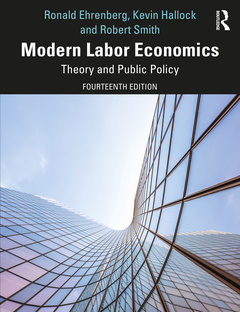Description
Modern Labor Economics (14th Ed.)
Theory and Public Policy
Authors: Ehrenberg Ronald, Smith Robert, Hallock Kevin
Language: English
Subjects for Modern Labor Economics:
Keywords
Labor Market; Labor Demand; Economy; Labor Supply; Human Capital; Inequality; International Trade; Unemployment; Earnings; Wage Differentials; labor economics; labour economics; demand for labor; wages; wage growth; minimum wage; labor mobility; productivity; labor unions; trade unions; labor market inequality; Labor Demand Curve; gender pay gap; Worker’s Marginal Revenue Product; automation; Marginal Revenue Product; gig economy; Labor Supply Curve; Compensating Wage Differentials; Indifference Curve; Labor Demand Curve Shifts; Isoprofit Curve; Demand Curve; Higher Skilled Workers; Reservation Wage; Substitution Effect; Earned Income Tax Credit Program; Marginal Expense; Married Women; Income Effect; Production Possibilities Curve; Data Set; Labor Force Participation Rates; Hicks Marshall Law; Wage Elasticity; Marginal Revenue; Ui Tax Rate; Monopsonistic Conditions
202.60 €
In Print (Delivery period: 14 days).
Add to cartPublication date: 08-2021
· 17.8x25.4 cm · Hardback
Approximative price 79.30 €
In Print (Delivery period: 12 days).
Add to cartPublication date: 11-2021
· 17.8x25.4 cm · Paperback
Description
/li>Contents
/li>Readership
/li>Biography
/li>
Modern Labor Economics: Theory and Public Policy, now in its fourteenth edition, continues to be the leading text for one-semester courses in labor economics at the undergraduate and graduate levels.
It offers a thorough overview of the modern theory of labor market behavior and reveals how this theory is used to analyze public policy. Designed for students who may not have extensive backgrounds in economics, the text balances theoretical coverage with examples of practical applications that allow students to see concepts in action.
The authors believe that showing students the social implications of the concepts discussed in the course will enhance their motivation to learn. Consequently, this text presents numerous examples of policy decisions that have been affected by the ever-shifting labor market.
This new edition continues to offer the following:
- a balance of relevant, contemporary examples
- coverage of the current economic climate
- an introduction to basic methodological techniques and problems
- tools for review and further study
This fourteenth edition presents updated data throughout and a wealth of new examples, such as the impact of COVID-19 lockdowns, gig work, nudges, monopsony power in the technology industry, and the effect of machine learning on inequality. Supplementary materials for students and instructors are available on the book?s companion website.
1. Introduction; 2. Overview of the Labor Market; 3. The Demand for Labor; 4. Labor Demand Elasticities; 5. Frictions in the Labor Market; 6. Supply of Labor to the Economy: The Decision to Work; 7. Labor Supply: Household Production, the Family, and the Life Cycle; 8. Compensating Wage Differentials and Labor Markets; 9. Investments in Human Capital: Education and Training; 10. Worker Mobility: Migration, Immigration, and Turnover; 11. Pay and Productivity: Wage Determination Within the Firm; 12. Gender, Race, and Ethnicity in the Labor Market; 13. Unions and the Labor Market; 14. Unemployment; 15. Inequality in Earnings; 16. The Labor Market Effects of International Trade and Production Sharing
Ronald G. Ehrenberg is the Irving M. Ives professor of industrial and labor relations and economics at Cornell University. He has been honored for his teaching by receiving Cornell’s highest university-wide award: the Stephen H. Weiss Presidential Fellowship "for effective, inspiring, and distinguished teaching of undergraduate students and for outstanding contributions to undergraduate education."
Robert S. Smith is Professor of Economics at Cornell University. He has been honored for his teaching by receiving Cornell’s highest university-wide award: the Stephen H. Weiss Presidential Fellowship "for effective, inspiring, and distinguished teaching of undergraduate students and for outstanding contributions to undergraduate education."
Kevin F. Hallock is President and Professor of Economics at the University of Richmond. He previously served as Dean of the Cornell SC Johnson College of Business, Dean of School of Industrial and Labor relations, the Joseph R. Rich ’80 professor of economics and human resource studies, and Director of the Institute for Compensation Studies at Cornell University.




